Crowning in Marriage

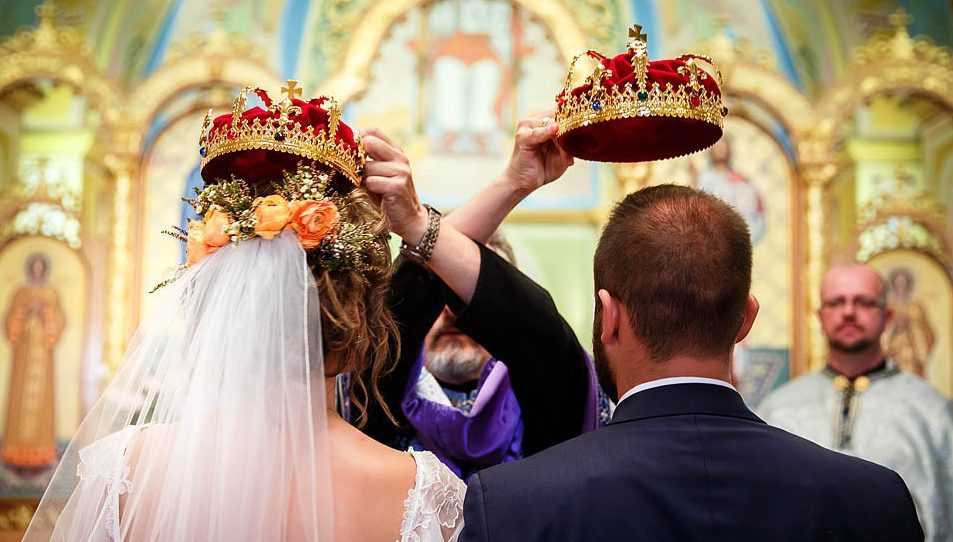
Next month I get married. In the Byzantine Church we are “crowned” in marriage and the service is quite a bit different from what you might expect. So, to help those attending, I’m building up a list of resources…
"We are travellers…not yet in our native land" – St. Augustine


Next month I get married. In the Byzantine Church we are “crowned” in marriage and the service is quite a bit different from what you might expect. So, to help those attending, I’m building up a list of resources…

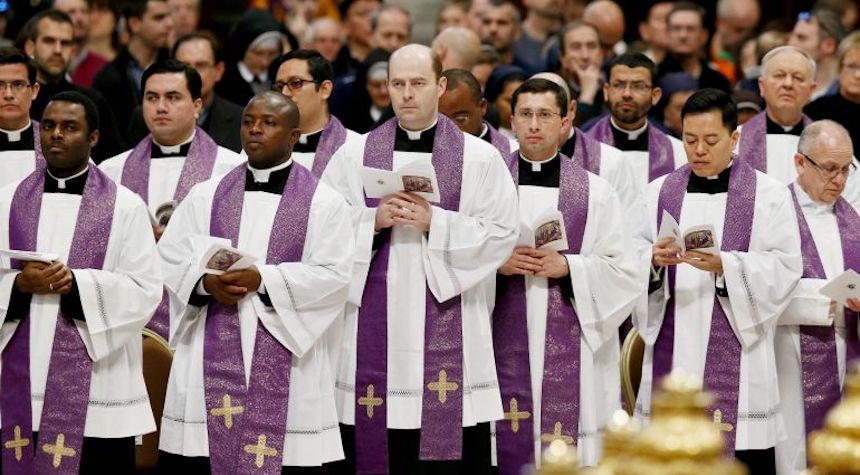
A few months ago, I got a new Dad… well, sort of.
Following the retirement of one the priests in our Eparchy (the Eastern name for a Diocese), our Bishop reassigned many of his priests. As a result of this shuffle, our Pastor was sent to Denver and our parish given to a new priest.
This kind of situation occurs periodically in the life of a Catholic parish. A few years after I started attending my Byzantine church, the Bishop assigned our Pastor to the role of Rector at our Seminary in Pittsburg. Fr. Robert had been at the parish for many years. He had been our spiritual father for a long time and had married and baptized many in our parish. As a result, his transfer was quite a wrench for us.
Although these periods of transition can be rather painful, on the whole, I think this is good for the spiritual health of the parish. By having our priests changed every few years, we are taught a certain level of detachment and are given some inoculation against a cult of personality which may form around a particularly charismatic minister. It also offers us periodic opportunities for parish renewal. Most of all though, it reminds us of what is transient and what is unchangeable. The man standing at the altar may differ, but the Eucharist remains the same.
For from the rising of the sun to its setting my name is great among the nations, and in every place incense is offered to my name, and a pure offering; for my name is great among the nations, says the Lord of hosts
Malachi 1:11
This page contains some of the interviews I’ve given on other radio shows and podcasts. The C. S. Lewis Podcast Pints With Jack (Download | Live Link) C.S. Lewis Reading Day (Download | Live Link) The Inklings Variety Hour Talking about the first part of “The Voyage of the Dawn Treader” Dawn Treader, part 1 (Download | Live Link) Curious
Read moreOne of my favourite YouTube channels is “HIstory Buffs”. However, I remember watching the episode on “Agora” and being more than a little suspicious about its representation of what happened in Alexandria:
I came across the following commentary on Reddit:
00:20 “Set during the last days of the Roman Empire”. The movie is set in 391 AD. The Western Roman Empire wouldn’t fall for another 85 years and the Eastern one not for another 1062 years. But who cares about details?
01:21 “Alexandria was founded by knowledge” Being close to the river delta of the Nile, one of the most important rivers of the Mediterranean Sea certainly didn’t hurt. To the maker’s credit, he later mentions this himself at 02:30. The statement is misleading nonetheless.
01:40 “Alexander’s open-minded approach to their [the Egyptians’] religion and custom”. They hailed him as a half-god and he didn’t stay long. Of course he liked them.
03:30 “His empire would be divided.” He makes it sound as though the fracture of Alexander’s short lived empire was some sort of amicable power-sharing and not decades of war.
3:44 “Science”. Science didn’t exist back then. Call it “proto-science” or “natural philosophy”, but not “Science!”.
04:05 The claim that everybody who entered the city was searched for books. If they had pulled that off, nobody would be willing to take his books to Alexandria because nobody would want to wait for weeks while some scribe went through the labor of copying every word of his book by hand. I am aware that some ancient sources claim they did, but blindly following sources is not proper study. The story is just too impracticable to be taken without salt. And it’s unnecessary to bring it up here! This plays no role in the movie.
04:20 “These books were eventually the only ones to survive the years [because they were constantly copied in the Library of Alexandria].” Yes, sure. Nobody else copied books. Everyone else was stupid. Athens? Stupid. Rome? Stupid. Constantinople? Stupid.
04:50 Come to see a movie review. Stay to listen to an infatuated teenager indulging in his Library of Alexandria fetish. Because there were no other centers of learning.
05:50 Here he blames much of the destruction of the LoA on Caesar’s conquest. This is a possible theory, but by no means the only one. Here it’s given as an unshakeable fact.
06:28 “The Serapeum was all that was left of the original library”. Here I will refer to Tim O’Neil’s review. His position is that not a single ancient source, even pagan ones who didn’t like Christianity, linked the destruction of the Serapeum to the loss of a library. There once was a library in the Serapeum, but not by the time of the movie. History Buffs seems curiously ignorant of this possibility, considering how this movie is all about keeping an open, questioning mind.
08:20 I know I promised not to talk about the actual movie. But this scene was chosen by History Buffs to highlight Hypatia’s intellect. The problem is that the answers her students give are not along the lines of Aristotelian natural philosophy. People had asked why objects fall before and “because it’s heavy” would not have sufficed. It would be more like “the cloth is earthly and that element tends to the center of the universe”. And one of the assembled adults would have given that answer.
08:55 Why did the movie give this Christian orator a horrible accent and bad teeth and the pagan one a posh accent and clean robes? Did anyone who made this movie ever stop to think about why people decided to become Christian? And why does History Buffs fail to point out this blatant black & white painting?
10:02 NO critical distance by History Buffs. They take this movie at its word. By the way, until some point I was still hoping that the speaker would suddenly burst out and say it was all a prank and that this movie was biased as hell. He didn’t.
10:50 So Neoplatonist were atheists then? Or what exactly are we to believe their religious motives were? The following explanation does not really answer this.
12:22 History Buffs fails to note that not a single Roman soldier wears the ridge helmet that was typical for the late Roman army.
14:00 “But the true loss came when Christians descended on the library – and tore it apart [dramatic music]”. Again, we have no firm evidence to suggest that there was a library of significance in the Serapeum. He tries to hedge by saying this library was smaller, but then backtracks and claims that its loss “cannot be understated”. Again, obvious LoA fetish.
14:40 “The last bastion of the ancient wisdom [The Serapeum , meaning the LoA] was gone”. Because there was not a single library elsewhere. Anywhere.
14:45 “All other pagans had either converted or fled Alexandria”. Actually, this makes sense. According to Wiki “Pagus” means country dweller, so pagans literally didn’t live in the city of Alexandria, but in the countryside. Ok, enough wordplay, let’s move on.
14:50 “The Empire had divided and the once mighty city of Rome had been sacked by barbarians only five years before”. The Empire had been divided for quite some time already. Theodosius briefly reunified it, but its recent re-division would not have shocked anyone. Also, given that Alexandria was in the Eastern Roman Empire and the Goths were hardly the ‘worst sackers ever’, I don’t think a strong, independent woman like Hypatia would get depressions over it.
15:20 “I have been unable to find any evidence for this.” Now you start caring about evidence?
18:35 “He declared Hypatia to be a witch” I don’t care whether the movie has a nice scene about it. Declaring somebody a witch 1000 years before the actual witch craze only panders to the common “Christians hate women and declare them witches” stereotype. There were isolated incidents before the witch craze, granted, but I have never, ever, heard of Hypatia being accused of being a witch. Again, not a single critical thought by History Buffs. He just retells the movie.
19:15 It is true that Hypatia had a very painful death, but “in the olden days” a lot of politically motivated killings were slow and painful. Sadly, hers was hardly special.
19:35 “Later he [Cyril, the bad guy] was declared a saint”. Maybe because in real-life he wasn’t the walking one-dimensional stereotype he is in this movie?
19:37 “If science ever had a martyr, it was Hypatia.” She was not a scientist. She was a natural philosopher. And she wasn’t a martyr for natural philosophy either, she just was collateral damage in a power struggle in Alexandria between two Christian factions. On the other hand: At least he didn’t mention Bruno or Galileo, so that’s cool.
20:30 “You [a Christian] do not question what you believe. You cannot. I must.” I find it ironic that History Buffs has this obvious infatuation for Hypatia, incorporates this scene into the review, showing the importance of critical thinking, and never ever questions whether the “Greeks = intelligent and good, Christians = bad and stupid” narrative might be ever so slightly wrong and that Christians could contribute to philosophy.
21:10 Here he admits that there is hardly any surviving information about the actual events and that’s why he doesn’t want to point out inaccuracies in this movie. I mused why he was so ready and willing to give an obviously biased movie (all Christians seem to wear black rags and are hairy) the benefit of the doubt. I was interrupted when he immediately blamed that loss of information on the Christians (“It’s because of stupid shit like this”), instead of a host of problems stifling the leisure to write chronicles, together with the centuries of time that seeped away the sources that were actually written, due to natural spoilage.
20:22 “We know Hypatia was probably in her fifties or sixties at the time of her death… But it’s not that big of a deal to me”. Having a thirty-something-year-old crack elliptical orbits 1000+ years before Kepler later in the movie is not a big deal??? That’s about as believable as Denise Richards as nuclear physicist Christmas Jones in “James Bond: The World Is Not Enough”. The casting obviously tries to appeal to baser human perception and judging by History Buffs, it seems to work. Edit: This was never brought up, but I looked it up anyway: Kepler came up with elliptical orbits in his thirties, so Hypatia, being another human, certainly had the same potential (ignoring all the giants on whose shoulders Kepler stood). I still maintain that Hypatia is way too young and elliptical orbits require a suspension of disbelief, but I agree that her age is reconcilable with artistic liscence, as protagonists are played by good-looking people in almost all movies ever made.
24:20 “When Agora came out, let’s just say it wasn’t that well received by Christians.” I wonder why. He eventually goes on that this movie isn’t about Christianity but about general religious fanaticism. Fair enough. Why did they have to bend the evidence then, to shoehorn in their obvious message? He then likens the destruction of the fictional library by fantasy Christians to ISIS.
25:25 The previous bit was annoying, but it was only the build-up. “And so classical Greek and Roman literature were rejected by choice.” No. In the Latin West Greek eventually became extinct. They had no choice about Greek works, they just couldn’t read them. It might come as a surprise to History Buffs, but one of the last ditch efforts to translate Greek works into Latin in Odoacer’s Italy was done by a Christian named Boethius. He devoted his precious time (among other works) on Aristotle’s work on logic. Because he obviously hated Greek classical learning and rational thought \i. Oh, and Boethius is revered as a Catholic saint.
25:36 Here comes a quote from Tertullian. And a pronunciation straight out of /r/atheism. History buffs calls him a “Christian apologist”. Sounds strange? Where did this specific word come from, it seems so out of context? On to the Wikipedia! And yes, Tertullian is listed as a “Christian apologist”. Curious. He was an important Christian figure, but died about 100 years before Hypatia was even born. Clearly there have been no changes in Christian doctrine for 100 years, nevermind Constantine or the Council of Nicaea. I have already produced Boethius as a counter-example, I will not bother with a second one. AND Tertullian is not a saint. My example of a Christian scholar is literally holier than History Buffs’.
26:20 “And after the Fall of the Roman Empire the Church would be the sole institution in the western world” Except for the Byzantine/”Roman” Emperor and the Frankish, Visigoth, Anglo-Saxon and Lombard kingdoms.
26:30 “This period in time [The next 800 years] would be called ‘The Dark Ages.’” Oh. My. God. THANK YOU! It has been so long since I met somebody who seriously called everything until the 13th century “The Dark Ages”. Never mind Charlemagne. Never mind the Renaissance of the High Middle Ages. They were all unwashed savages!
26:36 “Step backwards in human development”. Presentism.
But it gets better 🙂
26:40 “With so much lost it’s impossible to say. Many historians speculate our civilization would be far more advanced than it is today”. We have a chartist! Who would have guessed they were still alive and well? Granted, he never outright shows it, but nonetheless: All hail The Chart of Scientific Advancement!!! Because nobody in China is able to do, what Greek Scientists can do! (deliberate capital letter on “scientists” by the way )
And it gets better still!
26:50 He speculates that if “The Dark Ages” hadn’t happened the Greek civ would have unlocked steam engines much sooner than it did. I would go even further. They would also have had access to much better tech and units than the other players and would easily have won the space race victory.
27:15 “What if science wasn’t seen as heresy”. The good old Conflict Theory, backed up by fiction, lies and ignorance.
27:20 Watch this scene. If The Chart was a movie, this would be it.

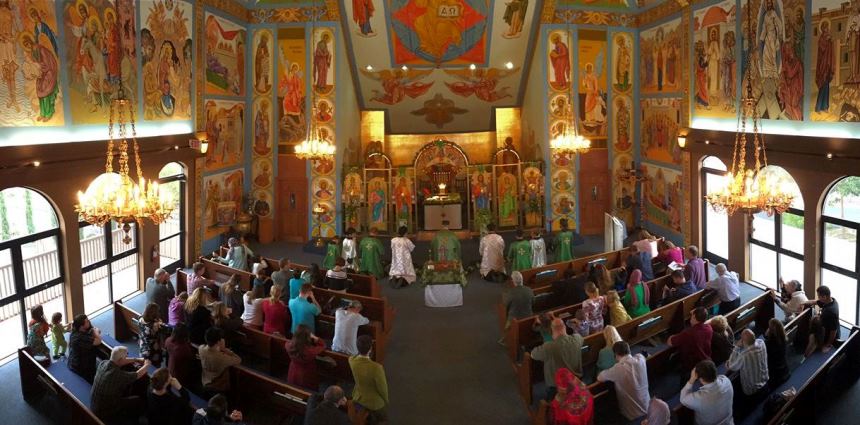
Those of you who know me, or who read this blog regularly will know that my parish is a Byzantine Catholic parish. The Catholic Church is often perceived as a uniform, monolithic structure. It is, in fact, much more diverse than most people realize. It is a communion of Churches which, while united in the one Faith, possesses a variety of liturgical and theological expressions known as “Rites”.
In this post I would like to tell the story of my discovery of the Eastern Rites of the Catholic Church and how I came to find myself a member of a Byzantine parish.
There And Back Again
I was baptized into the Catholic Church as a baby at a typical Latin Rite parish back in England. After receiving my First Holy Communion, I became an altar server, a role which I took very seriously. As I entered Senior School at the age of thirteen, my family started going to Mass at the Benedictine Abbey which was connected to my School.
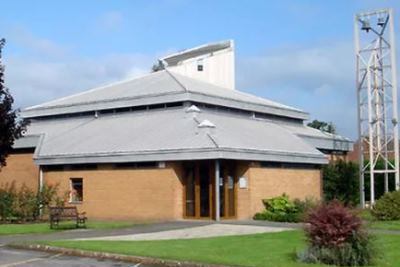
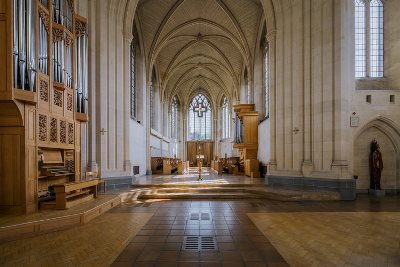
At University I had an awakening in my faith, after which I started really diving into Sacred Scripture. Unfortunately, after I graduated, I became disillusioned with the Catholic Church and spent several years attending non-Catholic congregations. However, after a few years, I began to see the fundamental problems with Sola Scriptura and the challenge of The Early Church, so I stopped attending non-Catholic congregations and once again returned to embracing Catholicism fully.
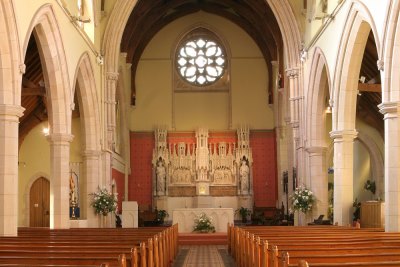

Church Visiting
At this time in my life, I was living in London, awaiting a long-term visa so that I could move to the United States. Most of my friends in London were Protestant Christians and several of them had invited me to visit their parishes. There was something about visiting other Christian communities across London which I really enjoyed. I loved “reading”, so-to-speak, the language of their liturgy.
Now, many of these congregations would have vociferously asserted that they didn’t “do” liturgy, but the truth is that every Christian community has a liturgy, whether they choose to call it that or not. For example, at my former Anglican parish, despite regular comments by the pastors that anything could happen when we gathered together, there was a very predictable pattern to each and every Sunday service.
So, regardless of whether the parish acknowledged that they had a liturgy of not, I was fascinated by what their services said about how the Christians there viewed themselves, how they viewed God, as well as their relationship to Him.
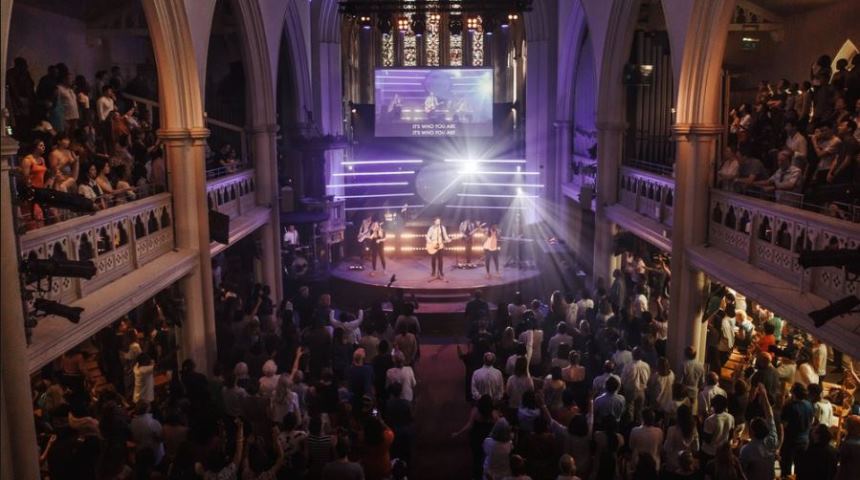
The Best of the Best
One of the Protestant parishes which I visited in London was especially interesting. The music was contemporary, but without the vacuous or insipid lyrics commonly associated with that genre of music. Instead, I noticed that the content was often strongly theological. The band was top notch. It was clear that, rather than any Eucharistic sacrifice, they saw singing as their principal act of worship. This is why I was surprised to see nobody in the congregation raising their hands in praise. Having previously been a member of a charismatic church, it took a good deal of self-control to keep my hands firmly at my sides!
Probably my favourite aspect of that congregation’s Sunday service was a segment which they called “The Heroes of Faith”. This was as close to the honouring of Saints as I’ve ever seen in an evangelical context. What would happen was that a member of the congregation would offer a 5-10 minute presentation on a Christian from history. They freely claimed pre-Reformation Saints as their own, as well as fathers of Reformation such as Martin Luther.
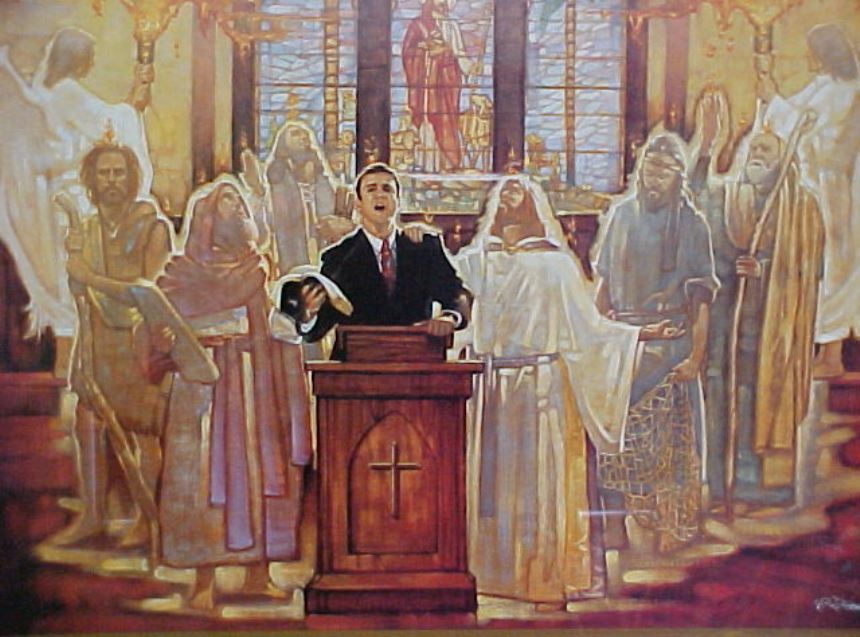
No Common Meal
While I enjoyed visiting these different communities, one aspect of these trips was a cause for sadness. On the occasions I attended somewhere which celebrated Holy Communion, I would have to abstain. It is pretty well-known that non-Catholics should not receive the Eucharist at Mass, but it is less well known that, in a similar fashion, Catholics should not receive Holy Communion in non-Catholic communities.
As I travelled home after one such service, with the weight of the Reformation on my mind, there was a vague spark of a memory which told me that there was another part of the Catholic Church where the liturgy was different from the Mass with which I was familiar, but which was also still Catholic, so I would be able to receive Jesus in Holy Communion. When I got home, I fired up my computer and did some very vague googling. After a few minutes it transpired that my brain had been trying to remind me of the Eastern Rites of the Catholic Churches. I opened a new browser window and then searched for Eastern Rite parishes near me. Fortunately, since London has a large immigrant population, I found quite a few within relatively easy reach.
A Tour of the East
Like most Western Catholics visiting an Eastern Catholic parish for the first time, I was rather nervous. I didn’t know what strangeness I might encounter! Both before and during the service, I checked and re-checked that this was, in fact, a legitimate Catholic parish in communion with the Bishop of Rome.
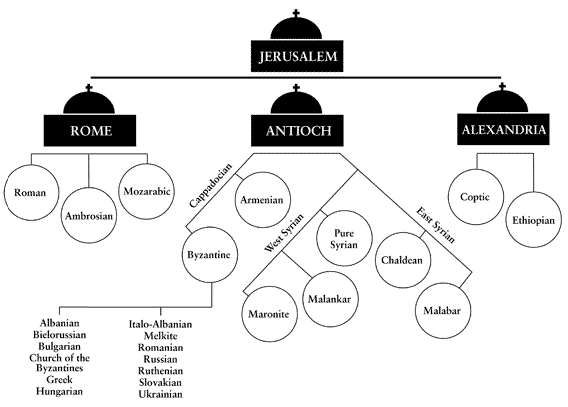
The first parish I visited was a Melkite congregation who celebrated the Divine Liturgy in an Anglican church. Since they were borrowing another denomination’s building, the interior wasn’t very eastern, although I do remember there being two large, beautiful icons of the Lord and the Theotokos which made a makeshift iconostasis. The Liturgy was in Arabic, but I could follow along somewhat using a book which had the English and Arabic side-by-side, much like the dual text you might use in a Tridentine Mass. At that Liturgy I received a foretaste of the Eastern emphasis on penance, with the entire homily devoted to the subject of fasting. This was then juxtaposed with the East’s love of feasting! As I left the building, a deacon was standing by the door holding a basket of what looked like bread. I froze, uncertain as to what was being presented to me. “What…or who…is this?”, I asked. “It’s not the Eucharist”, he replied, “It’s just blessed bread…we just like to keep the celebration going!”. My journey through the Eastern Rites of the Church now began in earnest…
The next parish I visited was a Maronite congregation, a parish which had a larger congregation than the Melkites I had visited and who shared a building with a Latin Rite parish. I was still nervous visiting, but once again I was warmly welcomed by the pastor. The Liturgy was also in Arabic, but this time the Arabic and English translation were projected onto the wall at the front of the church, which made it even easier to follow along. To my surprise, rather than handing out blessed bread at the end, we received a small, sweet pastry, something akin to baklava.
My visa for the USA came through around this time, but before I left London I had the chance to visit a Ukranian Byzantine parish. This was the largest Eastern parish I had visited so far. Seating was on two levels, but even then it was so full that I had to stand for the whole Liturgy. As with the previous parishes, the Liturgy was not in English, which meant that I had to rely on the “Liturgical Body Language” to understand exactly what was going on. It was a bit of shame that I couldn’t understand Ukrainian, because I remember the priest preaching very enthusiastically and wishing that I knew what he was saying.
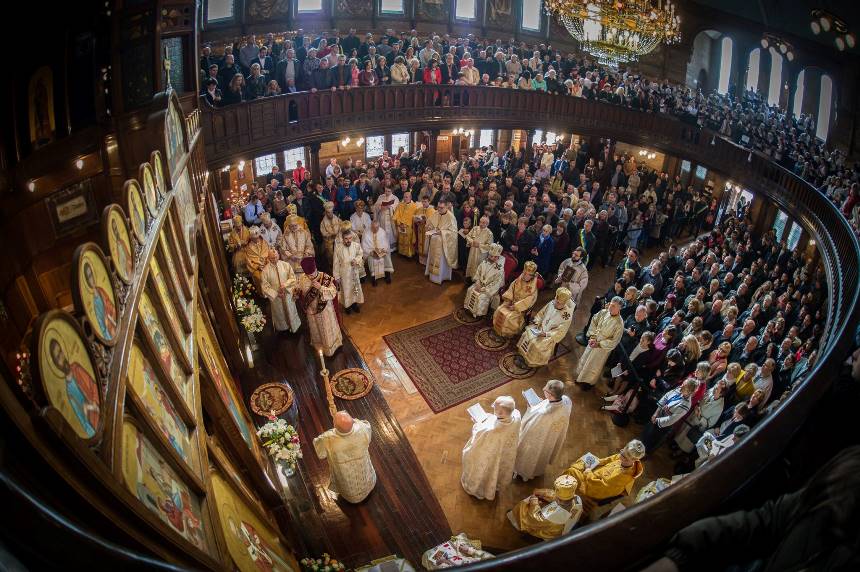
Finding the East out West
When I moved to the United States, it didn’t even occur to me that Eastern Rite parishes might be found here too, so upon arrival I just set about finding myself a home in the Roman Diocese. Unfortunately, I soon found myself split between more than one parish, such as playing the music for the youth Mass at one parish and running the young adult group at another.
Fortunately, LifeTeen Mass did not take place during the school vacations. Realizing that I was at liberty to visit other churches, it suddenly occurred to me that I might be able to visit another of those Eastern Rite parishes. To my great delight, I discovered one close by. You can read more about my visit here, but it is safe to say that I quickly fell in love with this parish. Not only was the parish of Holy Angels covered wall-to-wall with stunning iconography, I experienced the Byzantine Liturgy in English for the first time. I was almost giddy at how often the Early Church Fathers were mentioned. I loved that we sang virtually all the prayers, the chant being both beautiful and relatively easy to learn. For the longest time in my faith journey I had struggled with Marian devotion, but in the Byzantine Church I discovered a kind of love for Mary which came very naturally to me, helped, I would suggest, by the clear Christological focus in its Mariology. The parishioners noticed that I was a newcomer and came over to welcome me. On top of all this, the Pastor, Fr. Robert, was exceptionally kind to me and more than willing to answer my many, many questions.
At the end of the Summer, I returned to playing at the LifeTeen Mass, but over the coming months I took any opportunity to return, to attend Byzantine Vespers on Saturday night, as well as the occasional weekday service. I can’t quite remember how long I continued like this, but I think it was for about a year. Eventually, I became fatigued by being split across several parishes. I decided that I needed a single parish home. The choice was obvious. So, for the first time in my life, I officially registered at a parish, Holy Angels Byzantine Catholic Church.
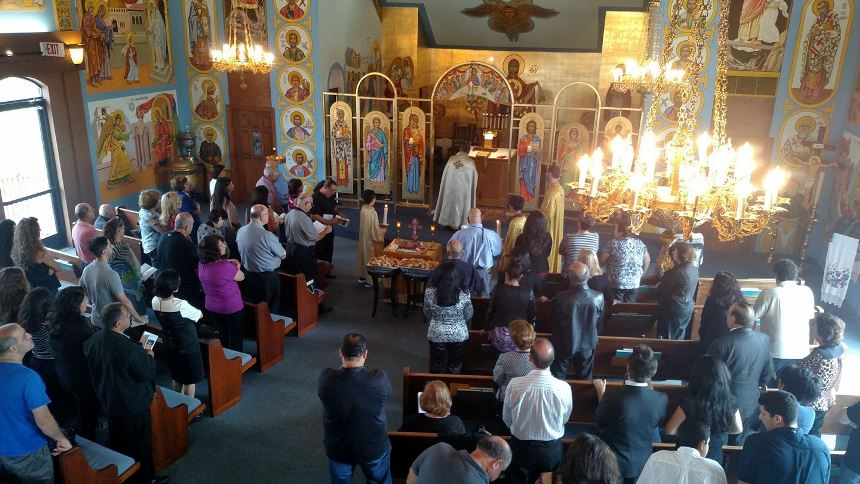
I recently came across this article from Daniel Dozier, a Deacon in the Byzantine Catholic Church, about his top ten ideas for Catholic Reform. I have to say, I’m kind of inclined to agree with him…
Step 1: Repent Publicly and Immediately and Announce a Plan of Reform.
Step 2: Investigate and Clean House.
Step 3: Create an Episcopal Accountability Board.
Step 4: Create Many More Bishops and Many More Dioceses.
Step 5: Build Fraternity Among the Remaining Clergy.
Step 6: Build an Organic Pipeline of Vocations for the Priesthood Through the Restored Use of Minor Orders, an Apprenticeship Model of Formation, an Extended Period in the Diaconate and with Required Professional Work Experience.
Step 7: Viri Probati.
Step 8: Begin a Preaching Campaign on Living an Evangelical Catholic Life.
Step 9: End the Liturgical Nonsense. End it. END IT.
Step 10: Restore the Election of Diocesan/Eparchial Bishops, Create a National Catholic Synod of Bishops with a Patriarch who Votes in the Election of the Pope of Rome.
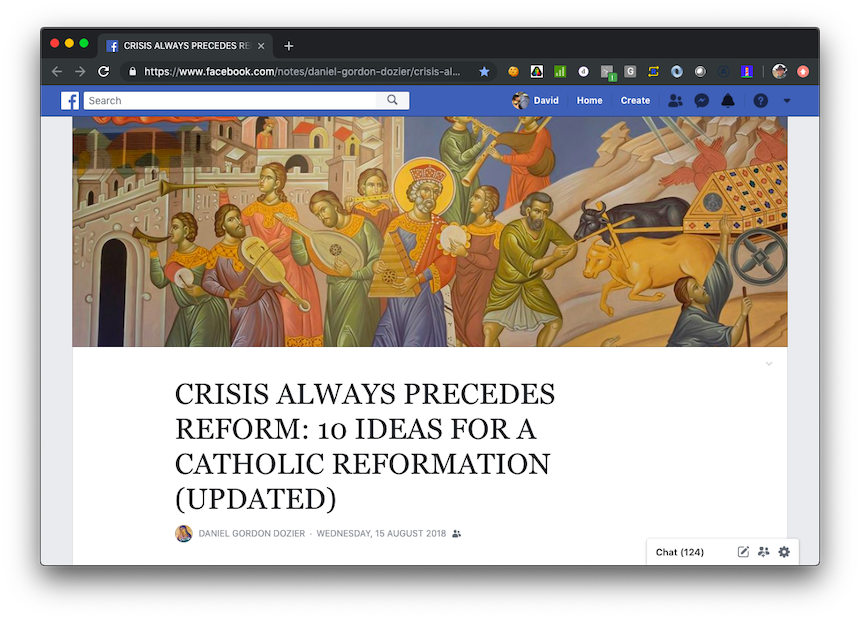
When people visit my Byzantine parish, one question they often ask is: “Why do some of the icons have scarfs on?”
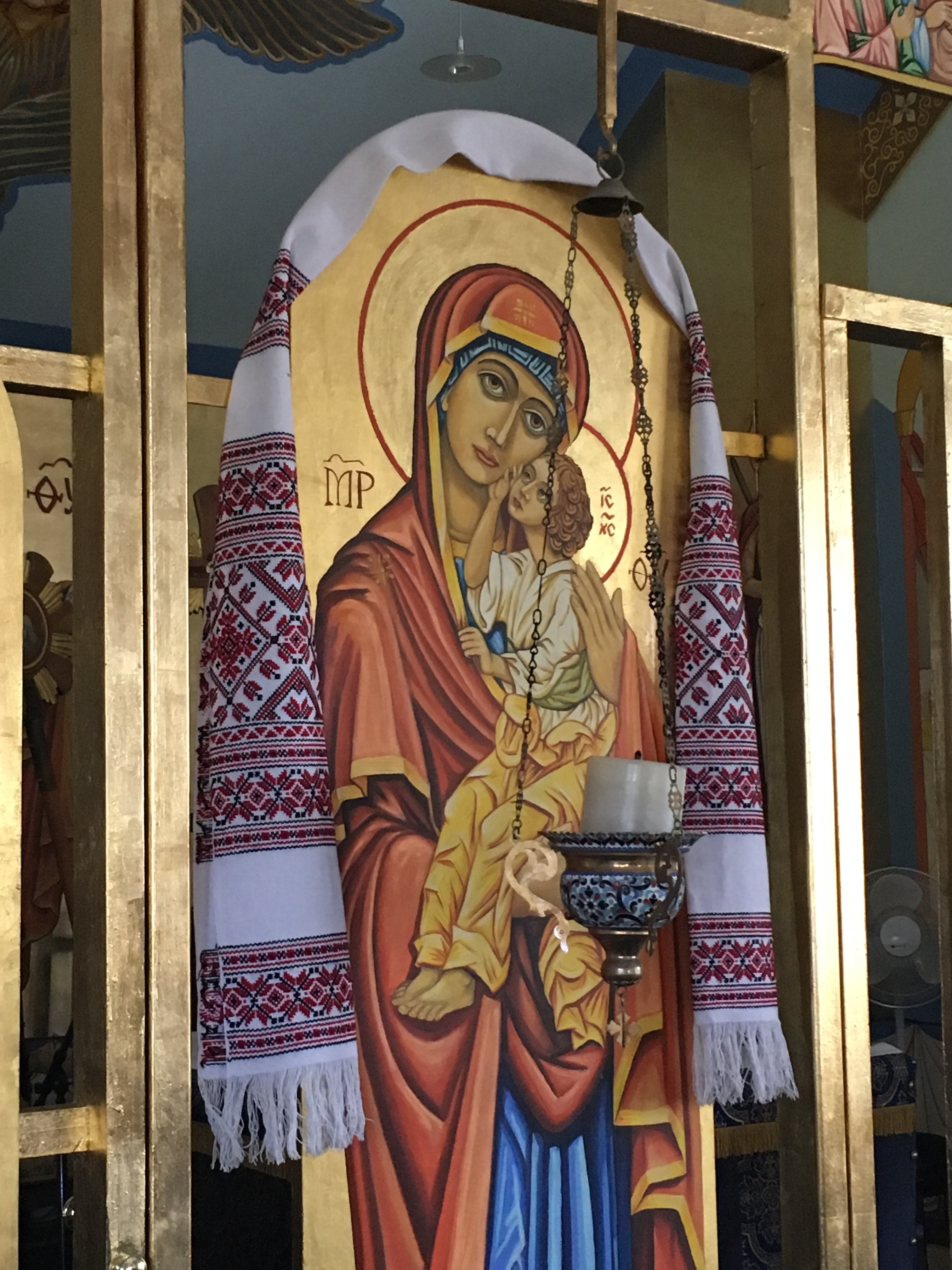
This scarf is an adornment which is simply a sign of devotion.
As far as I can tell, it began with the Kyivan Rus’ and Ukrainian Christians have continued to do so ever since. It appears to have links to the Holy Protection of the Mother of God